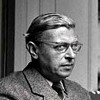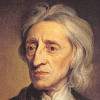“ can never be so great as the evidence of our own intuitive knowledge, whereby we discern it impossible for the same body to be in two places at once. ”
John Locke, An Essay Concerning Human Understanding (1689). copy citation
| Author | John Locke |
|---|---|
| Source | An Essay Concerning Human Understanding |
| Topic | evidence body |
| Date | 1689 |
| Language | English |
| Reference | |
| Note | |
| Weblink | http://www.gutenberg.org/cache/epub/10616/pg10616-images.html |
Context
“the ideas of one body and one place do so clearly agree, and the mind has so evident a perception of their agreement, that we can never assent to a proposition that affirms the same body to be in two distant places at once, however it should pretend to the authority of a divine revelation: since the evidence, first, that we deceive not ourselves, in ascribing it to God; secondly, that we understand it right; can never be so great as the evidence of our own intuitive knowledge, whereby we discern it impossible for the same body to be in two places at once. And therefore NO PROPOSITION CAN BE RECEIVED FOR DIVINE REVELATION, OR OBTAIN THE ASSENT DUE TO ALL SUCH, IF IT BE CONTRADICTORY TO OUR CLEAR INTUITIVE KNOWLEDGE. Because this would be to subvert the principles and foundations of all knowledge, evidence, and assent whatsoever:”
source



